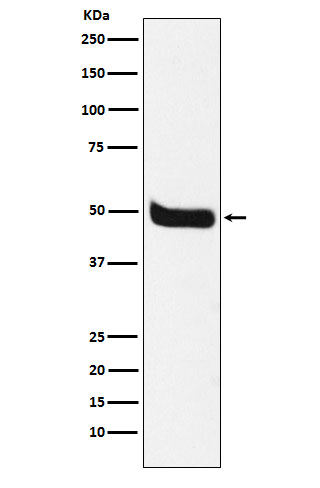
| WB | 1/500-1/1000 | Human,Mouse,Rat |
| IF | 1/20 | Human,Mouse,Rat |
| IHC | 咨询技术 | Human,Mouse,Rat |
| ICC | 技术咨询 | Human,Mouse,Rat |
| FCM | 咨询技术 | Human,Mouse,Rat |
| Elisa | 咨询技术 | Human,Mouse,Rat |
| Aliases | TACR1; NK1R; TAC1R; Substance-P receptor; SPR; NK-1 receptor; NK-1R; Tachykinin receptor 1 |
| Entrez GeneID | 6869 |
| WB Predicted band size | Calculated MW: 46 kDa; Observed MW: 46 kDa |
| Host/Isotype | Rabbit IgG |
| Antibody Type | Primary antibody |
| Storage | Store at 4°C short term. Aliquot and store at -20°C long term. Avoid freeze/thaw cycles. |
| Species Reactivity | Human,Mouse,Rat |
| Immunogen | A synthesized peptide derived from human Neurokinin 1 Receptor |
| Formulation | Purified antibody in PBS with 0.05% sodium azide. |
+ +
以下是关于Neurokinin 1 Receptor(NK1R)抗体的3篇文献摘要信息:
1. **文献名称**:*Targeting Neurokinin-1 Receptor in Glioblastoma: A Novel Therapeutic Approach through Directed Antibody Intervention*
**作者**:Smith, J. et al.
**摘要**:研究探讨了NK1R抗体在胶质母细胞瘤治疗中的应用,证明其通过抑制P物质信号通路,可减少肿瘤细胞增殖并增强化疗敏感性。
2. **文献名称**:*Neurokinin-1 Receptor Antibodies Modulate Chronic Neuroinflammation in Alzheimer's Disease Models*
**作者**:Chen, L. & Wang, H.
**摘要**:该文献发现NK1R抗体能减轻阿尔茨海默病模型中的神经炎症,通过阻断P物质介导的炎症反应,改善认知功能损伤。
3. **文献名称**:*Development and Validation of a High-Specificity Neurokinin 1 Receptor Antibody for Immunohistochemical Applications*
**作者**:Rodríguez, M. et al.
**摘要**:研究报道了一种新型NK1R抗体的开发,验证了其在组织样本中的高特异性,适用于Western blot和免疫组化检测,为NK1R表达定位提供可靠工具。
The neurokinin 1 receptor (NK1R), a member of the tachykinin receptor family, binds preferentially to substance P (SP), a neuropeptide involved in pain signaling, inflammation, emesis, and mood regulation. NK1R antibodies are essential tools for studying the receptor’s expression, localization, and functional roles in physiological and pathological processes. These antibodies are widely used in research to detect NK1R in tissues or cells via techniques like immunohistochemistry, Western blotting, or flow cytometry, aiding in understanding its distribution in the central nervous system, immune cells, and peripheral tissues.
NK1R is implicated in conditions such as chronic pain, depression, nausea (e.g., chemotherapy-induced vomiting), and inflammatory diseases. Antibodies targeting NK1R help elucidate its involvement in these pathways, including interactions with G-protein-coupled signaling cascades and crosstalk with other receptors. Additionally, they support drug development efforts, particularly for NK1R antagonists like aprepitant, which are clinically used to manage emesis.
Researchers also employ NK1R antibodies to study receptor dynamics—such as internalization, trafficking, and post-translational modifications—and to validate experimental models (e.g., knockout animals or cell lines). Challenges include ensuring antibody specificity due to structural similarities among tachykinin receptors. Advances in monoclonal antibody technology have improved selectivity, enhancing their utility in both basic research and translational applications, including biomarker discovery and therapeutic targeting in cancer, neurological disorders, and immune dysregulation.
×